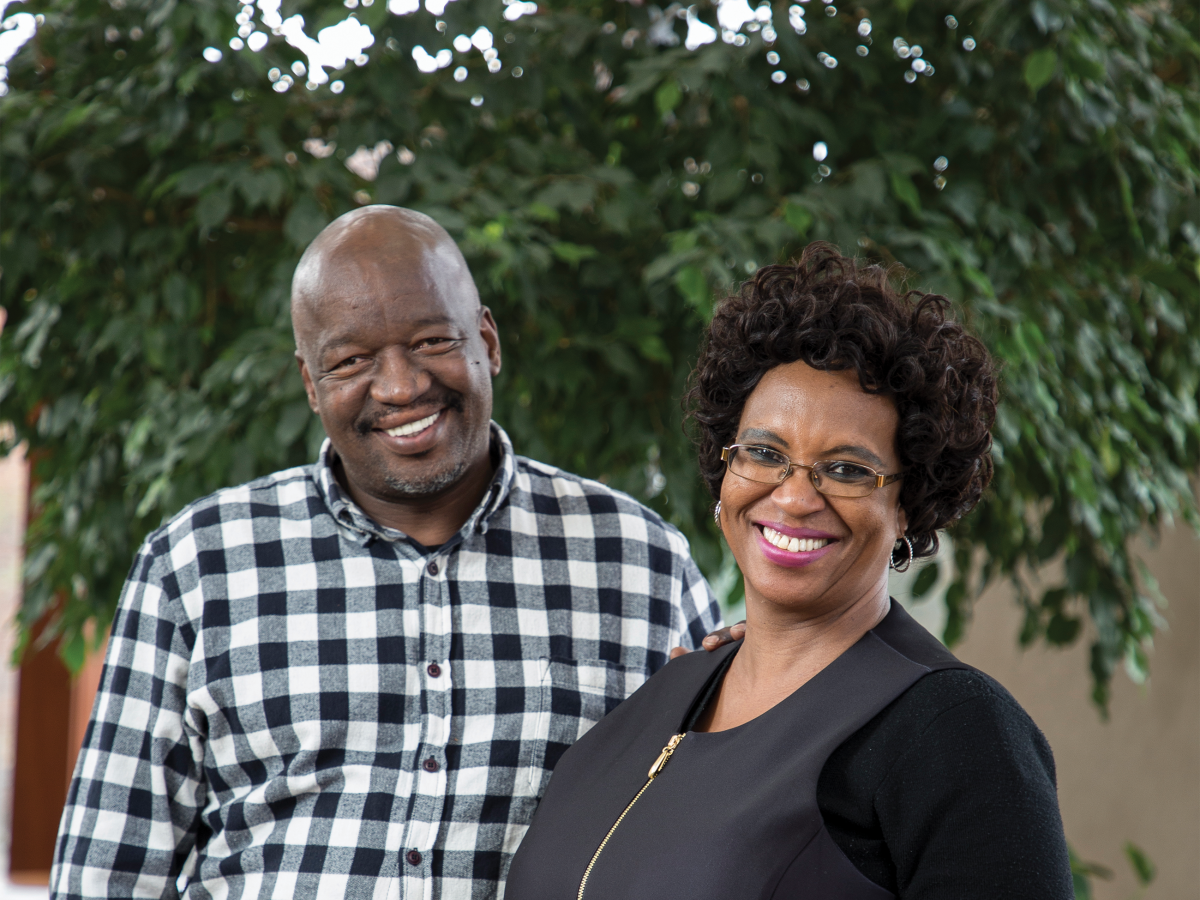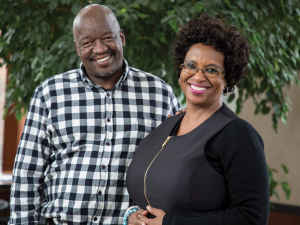A Memory of Hope, A Message from South Africa
It could have been yesterday as much as it was 29 years ago. Memories of life-altering events are undaunted in their tendency to do that. The vivid details of place, people and emotions, though decades old, spring back to full life and their brilliance in memory are just as clear as the day they were born.
Dr. Mpine Qakisa ’90 Makoe has one such memory. It not only changed her life, it changed a nation.
A native of Soweto, South Africa, Makoe remembers how, on Feb. 11, 1990, when she was a senior at Hope, she and her friends awoke at 2 a.m. to gather around a television set in College East Apartments to watch the release of Nelson Mandela from his 27-year imprisonment for opposing apartheid. Absorbed in the historical moment, the women watched and wept and cheered for hours, shunning sleep once the coverage ended and their classes started. Carried forward on coffee and adrenaline, Makoe’s elation continued throughout the day.
If her clarity of life and educational purpose was not firmly affixed in her mind prior to Mandela’s release, it certainly became a clear-as-a-bell vocational calling that day. She would return to South Africa to make a difference, she knew, first as a journalist to teach others about her renewed nation’s rising and then, as it happened, as a university educator to do the same but in a different way.
And it all started with her hope for a new future, in a new nation, with a college education in 1987.
And to Hope, she and her husband, Abbey, returned in October 2018, to impart experience and wisdom to a campus community each had longed to see — Mpine for the second time since graduation and Abbey for his first-time ever.
“We came back to Hope as a package deal so I could show Abbey what I rave about all the time,” Mpine laughed, which is often her cheerful way.
“Hope and Holland are very important part of her history in terms of her development as a person and her academic achievements,” Abbey said. “You can say this is where it all began for her and now she’s coming back as a professor to this school to give back to Hope students. And I’m just privileged to be part of it, to accompany her and see her retrace her steps.”
In the late 1980s and early 1990s, at the height of anti-apartheid tensions both in South Africa and in the international community, more than a dozen South African students enrolled at Hope as the college offered scholarships to them in partnership with the unifying church of South Africa, of which the Reformed Church in America played a part. Makoe arrived at Hope, after a year at Concordia College in New York City, as result of her home church’s connection. She double-majored in communication and English, graduated in 1990 and then promptly went on to earn a master’s degree in journalism from the University of Michigan in 1991. “I was so excited to get back [to South Africa] that I sped up my program and finished in a year,” she says.
For four years, Makoe indeed worked as a journalist for The Star newspaper headquartered in Johannesburg, but when she and Abbey started a family, she became a teacher, thinking maybe it would be a temporary career shift for her. “But as I went along I thought, ‘Here I can make an impact on people, too.’ Students who come in with their glassy eyes, full of hope, and then they walk away with something because you helped them see it, you made a difference. That is the beauty of education. And so many beautiful people did that for me, I just wanted to do that, too,” she reflected.
Another master’s degree and a doctorate, both in educational technology from The Open University in Milton Keynes, United Kingdom, sealed her future in higher education. Today, she is head of the Institute of Open Distance Learning at the University of South Africa in Pretoria.
“She has always been a leader. So many people knew her across the campus,” recalled Dr. Jane Dickie, whom Makoe fondly names as her mother figure while at Hope. “Mpine was teaching even then. It’s not surprising she became a teacher because in campus discussions, she would offer her thoughts and others would become silent because she’s wise, very wise. To a large extent, many of the students who came from South Africa during that time did step up and were in leadership roles on campus. So, whereas we might have thought we were doing a good deed for South African students, they left us with so much more, so much richness. Mpine was surely one of them.”
The Makoes’ recent return to Hope came at the invitation of Dr. Deirdre Johnston, professor of communication and interim associate dean of global education who met the couple in 2016 while she was teaching a June Term for Hope and international students on peace and reconciliation in South Africa. Both charming and engaging, but with the ability to cut to the quick of weighty matters, the Makoes spoke during a special presentation at Hope. Mpine discussed recent student activism and the #rhodesmustfall movement on campuses in post-apartheid South Africa; and Abbey, who is a political editor for the South Africa Broadcasting Corporation and CEO of Mpine Media (yes, he named his company after his wife), addressed the role of journalists in transforming South Africa after Mandela’s release to present day, an era when he reported from the townships and rose to prominence as one of South Africa’s most revered and sought-after political analysts.
Even though their October visit was during an unusual cold snap that required the unexpected purchase of new coats in downtown Holland to bear up under the unruly Michigan weather, the Makoes “just exuded a joy to be here,” said Johnston. “To reunite with her alma mater and former faculty here, to talk with today’s international students and address other students in communication classes, I could tell it was so invigorating and rejuvenating for them.”
The Makoes agree. With affirming smiles, they looked out on the western stretch of campus from the second-floor rotunda of the Martha Miller Center for Global Communication and watched intently as students walked to classes bundled up in freshly unpacked jackets. Mpine tugged on her new outerwear and thought of her work on her own campus in Pretoria, South Africa, where she leads and teaches and writes journal articles and books on open-distance and online learning. Surely it is warmer there, she thought, but only weather-wise. The glad welcome she and Abbey received at Hope, the emotions that emanated from her reminiscing and dreaming, from her teaching and meeting — those warm feelings made up for the temperature difference. Later at her address, she boldly proclaimed what she hoped for all institutions of higher learning, a nod to her current specialty and her Hope history.
“The university of the future is digital, global, equitable and lifelong,” she said. “Information is everywhere, and if you have technology, you have the power to learn. But access to that technology is not equal. And I know what it is like not to have access to things.”
“Hope gave me access to an education in a lifelong way,” she explained earlier. “It gave me people who contributed to my life without fully knowing who I am, taking a risk on me. And it gave me a desire to do the same for others.”
Hope gave me access to an education in a lifelong way. It gave me people who contributed to my life without fully knowing who I am, taking a risk on me. And it gave me a desire to do the same for others.


